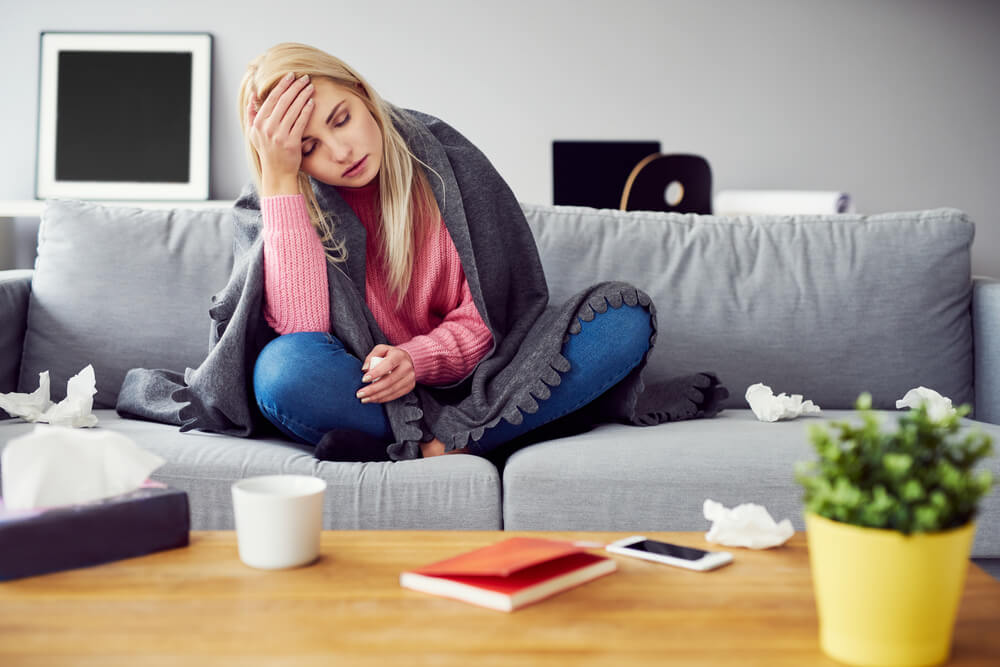Can You Get a Fever During Your Period?
People call this the “period flu” because even though you do not actually have the flu, many of the symptoms you experience while menstruating can make you feel flu-ish. After menstruation, your hormone levels will balance out again, and your temperature will return back to normal. Symptoms of period flu usually begin after ovulating, which takes place in the last two weeks of your average menstrual cycle, which is typically 28 days.
As women, we experience various symptoms before and during our period, but developing a fever and chills during your period may take you by surprise. You may even find yourself asking, “how can you get a fever during your period?” Due to a rise in basal core body temperature during your menstrual cycle, low-grade fever during a period is normal, thanks to hormonal fluctuations.
What Are Symptoms of Period Flu?
The fluctuation in hormones that take place during your period can cause symptoms that vary from person to person. Unfortunately, the period flu is still misunderstood in the medical community, despite many people experiencing it each month with their cycle. To treat these symptoms, you must start by understanding how to identify them.

Here are some signs and symptoms of period flu:
- Chills or fever during period
- Nausea
- Dizziness
- Headache
- Fatigue
- Muscle aches and cramps
- Joint pain and discomfort
- Constipation
- Diarrhea
- Backache
- Bloating
- Backache
- Tenderness in abdomen
- Trouble concentrating
Although period flu is not the same as influenza, many of the symptoms are incredibly similar and can be debilitating in your everyday life, especially since they are often cyclical. These bothersome symptoms present around the same time every month before your period begins.
Why Do These Flu-like Symptoms Occur?
You are probably curious why these flu-like symptoms, like fever during periods, occur before and during menstruation. Experts believe that the changes in hormones throughout your menstrual cycle are typically responsible.
Prostaglandins are produced to assist the uterus in shedding its lining before your period, and the excess travels into the bloodstream, igniting many digestive-related period symptoms. This may cause aches and pains, cramps, diarrhea, nausea, vomiting, feeling flushed, and elevate body temperature to a low-grade fever during your period. At the same time, estrogen decreases can cause fatigue and those uncomfortable cramps, tenderness, and mood swings symptoms.
Your brain goes through chemical changes during your period and can affect serotonin levels triggering PMS symptoms like depression, exhaustion, cravings, and sleep issues. Early symptoms of PMS can cause several of the same symptoms of pregnancy, including nausea, fatigue, bloating, and breast tenderness or swelling. Because symptoms vary from woman to woman, treatment will too, and treatment will be dependent on the severity of symptoms.
If these things affect your everyday life, including work and social activities, or if they do not improve after your period ends, we recommend that you see your doctor for a well-woman exam.
Where Can I Buy a Basal Thermometer?
You can visit your local pharmacy to find a basal or digital thermometer to monitor your low-grade fever during your period. By measuring your basal body temperature while you are ovulating, you will be able to better track the onset of your symptoms and prepare yourself. You can also learn when you are least and most likely to become pregnant through this monitoring.
How To Relieve Symptoms
Thankfully, there are many easy options to help you find some relief while experiencing these uncomfortable and bothersome symptoms of the period flu.
Here are some effective treatments:
- Take an over-the-counter nonsteroidal anti-inflammatory medication such as Advil or Motrin. This medication blocks the creation of the making of more prostaglandins in the body, which can curb many unwanted symptoms.
- Birth control can help regulate your hormones and keep them steady throughout the month by preventing ovulation from occurring.
- Over-the-counter antidiarrheal medications, such as Pepto-Bismol and Imodium, can stop diarrhea and digestive discomfort, including nausea.
- Staying hydrated is key in preventing headaches and compulsive eating before your period.
- Placing a heating pad on the lower abdomen and pelvis for fifteen minutes or so each day can help reduce muscle aches and pains, and cramps during your period.
If none of these methods of treatment works in relieving your symptoms, speak with your gynecologist. Through an exam and blood workup, your doctor can help you determine your symptoms’ cause and get you feeling better and back on track.
How To Prevent Future Symptoms
Certain lifestyle changes and therapies can also help you to prevent or at least minimize future symptoms. Here are some ideas about things you can begin to implement in your routine to improve the uncomfortable, painful symptoms of period flu before your next cycle.
- Regular exercise has been proven to prevent or reduce much of the discomfort associated with period pain, including fatigue, cramps, and emotional effects such as depression. Aerobic exercise effectively reduces water retention and excess fluid in the joints, further reducing PMS symptoms.
- It is important to maintain a healthy diet, especially leading up to and while you are on your period. Indulging in alcohol, caffeine, sugar, sodium, and processed food cravings can create inflammation in the body and make you feel much worse.
- Getting enough sleep, ideally, seven or more hours a night will reduce the severity of PMS and period symptoms, especially fatigue. Sleep deprivation is linked to mood swings, anxiety, and depressions and can contribute to bad headaches, unhealthy eating habits, and cravings.
- Smoking worsens PMS symptoms, and it is additionally linked to early menopause and irregular menstruation. Speak to your physician today about how you can quit.
- Vitamins such as calcium and vitamin B-6 can reduce the severity of PMS, mood swings and changes, bloating, and more.
- A shift in dietary changes, such as smaller meal portions to keep blood sugar leveled out, consuming whole grains and healthy fatty acids, and eating foods rich in nutrients, can assist in overall well-being during menstruation or otherwise.
- Yoga, massage, and meditation have been helpful for many women as well.

What If Symptoms Do Not Go Away
If physical or emotional symptoms of PMS or the period flu interfere with your daily social and work life or relationships, we advise following up with your doctor. An underlying condition, such as a menstrual or thyroid disorder, could be contributing to your struggles. This is true if you are experiencing any symptoms beyond period flu, such as a vaginal infection or persistent fever and chills during a period as well.
Suppose you experience irregular or skipped periods, heavy and/or painful periods, pain during penetration or intercourse, and unidentifiable weight loss. In that case, it is crucial to be examined and evaluated during or before your well-woman exam.
The Takeaway
So can you get a fever during your period? Yes. While the period flu may not be recognized as an official medical condition, severe symptoms of PMS and menstruation, like fever and chills during a period, are incredibly disruptive for many women.
Hormonal fluctuations can affect all of us at some point, but it is important to stay two steps ahead by knowing how to treat and prevent your symptoms. And remember, while at-home remedies and lifestyle changes can help, it is best to advise your doctor. We at University Park OBGYN are a group of expert physicians and nurses who are willing and able to guide you through your gynecological care.
If period flu is getting in the way of your life and routine, reach out to us today to schedule your well-woman exam and let us help you get back on track.


